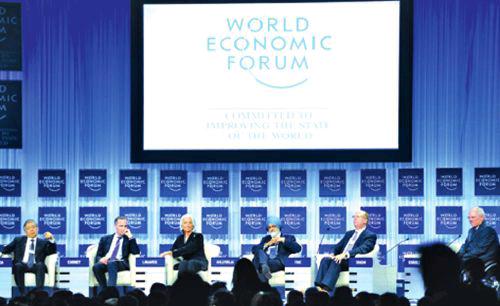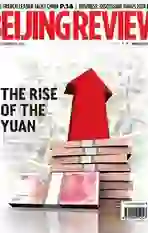Taking Center Stage
2014-02-25ByZhouXiaoyan
By+Zhou+Xiaoyan
At 8:55 a.m. on January 22, in a small town named Davos in Switzerland, a conference room is filled with moguls from different fields to discuss the topic of the most immediate relevance to the global economy—China. The conference is taking place as part of the annual meeting of World Economic Forum(WEF).
“In the special session on China, no seats were available even before it started. Some people stood and listened for the whole session,” Li Tie, Director General of China Center for Urban Development, wrote in his microblog, a Twitterlike website service. “The enthusiasm shown toward China-related topics is rarely seen in other areas.”
During the four-day meeting lasting from January 22 to 25, over 2,500 participants from almost 100 countries, including more than 1,500 business leaders and over 40 heads of state and government, exchanged views on problems such as global economic recovery, financial outlook, new energy, health and climate change.
The theme for this years forum, Reshaping of the World: Consequences for Society, Politics and Business, sets out in exact terms the three dimensions of the worlds current circumstances.
China was undoubtedly a buzzword. In the 115-page forum agenda, China was mentioned over 100 times. Eight sessions focused on sustainable economic growth in China, which is deliberately taking a bit of steam out of its economic engine to restructure its economy. How China, the worlds most dynamic economy, lives up to its role in the reshaping of the world and how the world judges its reform has become a focus of this years forum.
“Compared with several years ago, the WEF no longer focuses on financial crisis, while Chinas economic slowdown and reforms are one of the main focuses,” said Shi Liwei, Managing Director of the WEF (China).
Examining the slowdown
The global economy is on a bumpy path to recovery, shadowed by uncertainty, potential risks and challenges, experts said at the forum.
The Chinese economy expanded 7.7 percent in 2013, the slowest rate of annual growth since 1999. As emerging economies, in particular China, have served as the backbone to global economic growth after the 2008 financial crisis, there have been mounting concerns over the fact that the recent slowdown in China might deal a blow to the fragile global economic recovery. The flipside of the sweeping reforms promised by Chinas Central Government may be a further slowdown.endprint
To this end, Liu Mingkang, former Chairman of the China Banking Regulatory Commission, said at the Davos forum that China has deliberately slowed its pace of growth, in a bid to create more room for its economic restructuring.
“The pace of growth is slowing down. Thats a fact,” he said. “China wishes to change its growth model from relying on export and investment to promoting domestic consumption, and it is determined to reduce overcapacity and local government borrowing,” he said.
“The process is painful, but as the saying goes ‘no pain, no gain,” Liu said.
Hellmut Schuette, Vice President and Dean of China Europe International Business School, sees the slowdown of the growth rate in China as a natural development after years of breakneck growth.
“It is still growing very fast and we have to bear that in mind,” he emphasized.
For Schuette, the discussion about growth rates is not that important, as he said quality mattered more.
“I hope to see more quality growth which also takes care of employment issues and better provision of products and services to consumers.”
“I feel that we should somehow forget about the slowdown, which could be quite good and healthy for the economy,” he said.
Lloyd Blankfein, Chairman and CEO of The Goldman Sachs Group, Inc., agreed with Schuette.
“If you want sustainable growth, environmentally safe, producing high jobs, you have to accept a low goal,” he said.
“We welcome a moderate slowdown in China because current investment levels are unsustainably high,” said Zhu Min, Deputy Director of the International Monetary Fund. Chinas economic rebalancing will have a significant long-term impact on many countries.
The overall sentiment at the forum was that Chinas economy remains on the right track in supporting a slow but steady global recovery. But there was talk of plenty of risks ahead for China, including pollution, local government debt and increasing income disparity.
“If you dont address the issue of some people being too wealthy while other people languish in poverty, then that would be very detrimental to the development of society,”said Gao Xiqing, President of China Investment Corp..
Eye-catching reform
Chinas ongoing reform agenda will help boost the global economy, said experts at the forum.
Chinas new leadership pledged the boldest reforms since the Deng Xiaoping era at the Third Plenary Session of the 18th Central Committee of the Communist Party of China held in November 2013 in Beijing. A new round of reforms will cover political, economic, cultural, social and ecological fields. More than 300 major reform measures were announced, covering 15 categories in more than 60 fields.endprint
Participants at Davos analyzed how those reforms would reshape Chinas future, and the future of the world economy at large.
Foreign Minister Wang Yi said Chinas consumption-driven growth has brought about huge benefits to the world and will continue to do so.
“Chinese peoples strong purchasing power has led to global market prosperity. For instance, Chinese people bought 21 million units of cars in 2013, over 25 percent of total global auto sales. Chinese imports are getting close to $2 trillion.”
Not only are Chinese people good buyers, they are good investors, said Wang.
“When the global real economy is facing much difficulty in attracting funding, Chinese companies have become a new leading force in overseas investment. In 2013, Chinese companies overseas investment in the non-financial sector exceeded $90 billion,” Wang said.
Wang said China will provide the world with more “Chinese opportunities” in development as it is embracing a new round of comprehensive reforms. Chinese opportunities comprise market opportunities, investment opportunities, growth opportunities and cooperation opportunities. “China has every confidence in the success of its reform,” he said.
Schuette said the reform will result in fairer competition in the country. “Consumers in China will be better off thanks to tougher competition in the market. Overall we have learned from around the world that if you want to have excellent companies in your country, you have to have a lot of competition,” he said.
Companies aiming to exploit favorable labor costs in China would find themselves on the wrong footing, said Schuette. “China is no longer the low-cost country that it was 10 years ago.”endprint
